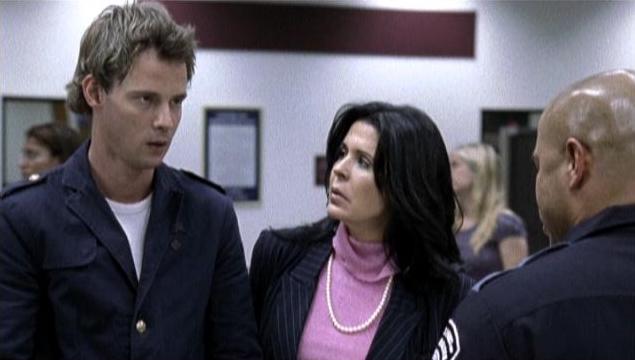Nashville Film Festival 2009: Live Action Shorts, Part 2
 #10: Round Trip (Ida y vuelta) - trailer
#10: Round Trip (Ida y vuelta) - trailer(11 min., USA/Spain; IMDB)
Eloy Azorín, the doomed son from All About My Mother, and the always welcome María Conchita Alonso propel this short, tough narrative in which they play a mother and son flying into the United States for a family wedding about which Alonso, at least, is none too excited. Trouble quickly brews from an unexpected direction, but in contrast to several festival shorts where ideological tensions between nations and cultures or between the power class and the most vulnerable subjects led to stilted or overstated drama, Round Trip keeps a vise-grip on nuanced character development. The ending arrives just a few narrative beats before I hoped it would, and the film doesn't excel conspicuously in any particular area of formal craftsmanship, but it's taut, persuasive, and well-acted, and it doesn't boil down to any takeaway moral.
 #9: The Watch (El Reloj)
#9: The Watch (El Reloj)(15 min., Argentina; IMDB)
Almost conversely to David Martín-Porras' Round Trip, Marco Berger's The Watch resists the urge to crystallize an event and instead wends a purposefully coy, smirking path around an event that isn't happening, at least as far as we can tell. At the outset of the film, teenaged soccer player Juan Pablo (Nahuel Viale) appears successfully to cruise a handsome fellow athlete named Javier (Ariel Nuñez Di Croce) while they await a city bus that never arrives. The guys wind up at Juan Pablo's house, with Javier somewhat busily impersonating someone who has no idea where any of this is headed. What they find inside the house, beyond the dirty pink walls and a general dishevelment, is Juan Pablo's almost comically inert and narcotically dazed cousin, watching TV in his undies. Whether he's cognizant of the boys' libidinal errand marks another opacity in the film; Javier works hard to notice yet appear not to notice the cousin groping himself beneath his shorts while he lounges at the refrigerator door and sucks some yogurt off his finger. The Watch plays a little like Trick as directed by Harmony Korine: it's grotty and constipated, but it's winking beneath all the grub. The titular conceit about the watch doesn't quite come through, and the deliberately disjointed editing goes a bit above and beyond the call of confusing motives and rhythms. It's a wry, willful piece, mostly charming if subliminally a bit sad, and though a certain kind of audience expectation will be roundly thwarted, there's certainly an erotic charge to the film; it's just inextricable from a teasing joke.
 #8: The Pig (Grisen)
#8: The Pig (Grisen)(23 min., Denmark; IMDB)
Continuing our series of opposite tempers, Denmark's Oscar-nominated The Pig is as sweetly bourgeois and audience-flattering as The Watch is resistant to most forms of comfiness. You couldn't call The Pig subtle or unmechanical in the way it eases the audience into its grouchy-cute story about an elderly white surgery patient who grows swiftly attached to a painting in his recovery ward—and then protests mightily when the Muslim family of his convalescent roommate rejects the painting as subtly offensive. One of The Pig's many self-insulations from ruffling anyone's feathers is that this contest of wills is projected almost entirely onto the (broadly acted) children and relatives of the patients, clearing the way for Asbjørn and Aslam to achieve their own rapprochement once the ward clears out. All of this feels much more formulaic in retrospect, but the proficient set-up and plummy, winking tone are quite charming in the moment, and many films have pandered much, much more than this on their way to gratifying the generous range of audiences that The Pig leaves itself open to. The hero of the piece is production designer Mette Lindberg; whether she found or commissioned the porcine portrait of the title (and the improvised sketch of same that figures later in the comic accumulation), they are as beguilingly insipid as they possibly could be. The painting alone, of a pig leaping incongruously off a pier into a tree-lined lake, scores the movie's best joke, about how the most absurd objects can sometimes elicit profound emotional investments, even (or especially) when they're the only thing to cathect in a sterile environment at an uncomfortable time.
Labels: Festivals, International, Nashville, Queer Cinema, Scandinavia, Short Films, South America, Spain

















4 Comments:
They screened all the Oscar-nominated shorts and toons to us for the first time this year: I agree This Way Up was oddly undistinguished, and thought The Pig was somewhere in the middle of the live-action pack. Hope you get to see New Boy, at some point, and don't find yourself subjected to the ghastly Manon sur le bitume...
PS. LOVE Western Spaghetti. Thanks for the link!
It's interesting that Harmony Korine's name came up in your reviews a couple of times. Is he becoming super influential again on new filmmakers? Or is it that he just lives in Nashville?
Also, did you see Nicole Kidman?! Did she look mad with her plucked eyebrows?
@Tim: Very validating. I usualy try to catch the Oscar Shorts program when it passes through wherever I'm living, but I missed it this year. Maybe I'll track down the DVD; it's been fun to review so many shorts.
@JK: Indeed, the impress of Korine was strong: NAFF also booked a documentary about the filming of Mister Lonely, though I don't know anyone who saw it. I think he might even have popped up on site, but I'm not sure. As for Ms. Kidman, I missed seeing her by a few meters as she popped in and out of the festival's best movie, but I'll have more to say soon about that (the movie, not Nicole).
Post a Comment
<< Home